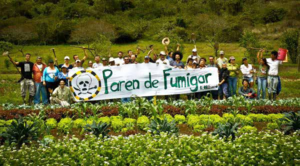Una mala apuesta en biología sintética
Silvia Ribeiro y Jim Thomas
Etiquetas: Biología sintética, es, Ribeiro
Este es un blog bilingüe fundado en mayo de 2004, dedicado a proveer perspectivas críticas sobre biotecnología y bioseguridad … This is a bilingual blog, founded in May 2004, dedicated to providing critical perspectives on biotechnology and biosafety. Contact: ruiz@tutanota.com.
Etiquetas: Biología sintética, es, Ribeiro

Etiquetas: en, Fish, New York Times
Etiquetas: en, ETC Group, Synthetic Biology
 During the last 20 years, Argentina has been the point of entry through which GMOs have spread out over the Southern Cone. To understand the role this country has played in the most spectacular advance by a crop ever witnessed since the beginnings of industrial agriculture, it is indispensable to note the introduction of “Roundup Ready” (RR) soybeans – which resist Monsanto’s Roundup herbicide – into this country almost simultaneously with their approval in the United States in 1996. Argentina was the beachhead from which RR soy illegally invaded South America, coming to occupy over 46 million hectares of Argentina, Brazil, Paraguay, Uruguay, and Bolivia within the space of two decades. They were helped along on this course by a lack of public debate and by corporate capture of the regulatory apparatus, leading to arbitrary adjustments of the legal framework to suit the corporations’ requirements.
During the last 20 years, Argentina has been the point of entry through which GMOs have spread out over the Southern Cone. To understand the role this country has played in the most spectacular advance by a crop ever witnessed since the beginnings of industrial agriculture, it is indispensable to note the introduction of “Roundup Ready” (RR) soybeans – which resist Monsanto’s Roundup herbicide – into this country almost simultaneously with their approval in the United States in 1996. Argentina was the beachhead from which RR soy illegally invaded South America, coming to occupy over 46 million hectares of Argentina, Brazil, Paraguay, Uruguay, and Bolivia within the space of two decades. They were helped along on this course by a lack of public debate and by corporate capture of the regulatory apparatus, leading to arbitrary adjustments of the legal framework to suit the corporations’ requirements.Etiquetas: es, Monsanto, Puerto Rico, Telesur